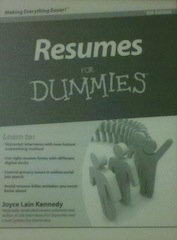Resumes for Dummies Book Review

I reviewed the 6th Edition of Resumes for Dummies by Joyce Lain Kennedy on Kindle to evaluate its usefulness as a resource for college students and recent college graduates who are preparing to enter the workforce. The book is designed to teach job seekers how to create resumes and search for jobs in today’s job market. In my assessment, the book has benefits and drawbacks for students and recent graduates.

The main benefits of this book for college students are the general resume writing information and the general job searching information provided for the new environment of today’s job market. According to the author, the Internet and current technologies, such as smartphones and social networking, have significantly changed the way job seekers must interact with potential employers. The author provides a wealth of information for finding employment in this new environment that would benefit any job seeker.
The author devotes a subsection of the book to specifically address the needs of recent graduates. This area offers specific advice to recent college graduate. For example, the author advises recent graduates who lack direct work experience to "thicken your work experience by including all unpaid positions – internships, special projects, and volunteer jobs."
Another feature of the book that I found to be especially beneficial was its information for job seekers lacking experience outside of their education. While job seekers who gain experience during college are in a much better position than job seekers who do not, those without experience do exist and they need to know how to create a resume that showcases the knowledge they have gained through their education. The author includes an example of a resume written by a job seeker with only education-related experience.
The greatest drawback of this book as a resource for college students is that only a small portion of the book is devoted to recent graduates. The book focuses mostly on mid-career professionals who are seeking changes.
Another drawback of the book is the presumption that the job seeker knows the basics of resume preparation. While the book does review some of the basics of resume writing, the information is obscured within the other topics of the book. Students and recent graduates who need help with the basics of resume writing might have an easier time if they begin with a different resource.
A drawback of the Kindle version of this book is that the resume examples are difficult to read on some Kindle devices. This is a significant drawback because examples are necessary for a resume book. Having the examples helps readers understand the author’s explanations. Also, the examples serve as models job seekers can use to develop ideas when creating their own resumes.
Despite drawbacks of the book, I found it to be a beneficial resource for job seekers entering the job market after college. Students and recent college graduates will likely gain an advantage in the job market by follow this author’s advice.

The main benefits of this book for college students are the general resume writing information and the general job searching information provided for the new environment of today’s job market. According to the author, the Internet and current technologies, such as smartphones and social networking, have significantly changed the way job seekers must interact with potential employers. The author provides a wealth of information for finding employment in this new environment that would benefit any job seeker.
The author devotes a subsection of the book to specifically address the needs of recent graduates. This area offers specific advice to recent college graduate. For example, the author advises recent graduates who lack direct work experience to "thicken your work experience by including all unpaid positions – internships, special projects, and volunteer jobs."
Another feature of the book that I found to be especially beneficial was its information for job seekers lacking experience outside of their education. While job seekers who gain experience during college are in a much better position than job seekers who do not, those without experience do exist and they need to know how to create a resume that showcases the knowledge they have gained through their education. The author includes an example of a resume written by a job seeker with only education-related experience.
The greatest drawback of this book as a resource for college students is that only a small portion of the book is devoted to recent graduates. The book focuses mostly on mid-career professionals who are seeking changes.
Another drawback of the book is the presumption that the job seeker knows the basics of resume preparation. While the book does review some of the basics of resume writing, the information is obscured within the other topics of the book. Students and recent graduates who need help with the basics of resume writing might have an easier time if they begin with a different resource.
A drawback of the Kindle version of this book is that the resume examples are difficult to read on some Kindle devices. This is a significant drawback because examples are necessary for a resume book. Having the examples helps readers understand the author’s explanations. Also, the examples serve as models job seekers can use to develop ideas when creating their own resumes.
Despite drawbacks of the book, I found it to be a beneficial resource for job seekers entering the job market after college. Students and recent college graduates will likely gain an advantage in the job market by follow this author’s advice.
You Should Also Read:
Interview Questions for Recent Graduates

Related Articles
Editor's Picks Articles
Top Ten Articles
Previous Features
Site Map
Content copyright © 2023 by Susan D. Bates. All rights reserved.
This content was written by Susan D. Bates. If you wish to use this content in any manner, you need written permission. Contact Eliza Morrison Nimmich for details.


